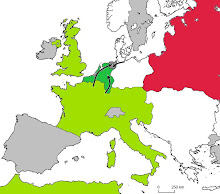 Early August saw OKW transferring a large number of divisions to face the new threat in the south. The western allies had crossed the Austrian alps and now had a foothold in southern Germany. The effect of this was marked. Hitler was furious that the hated enemy were now on German soil and removing them became a priority. However for once Hitler listened to his generals and Field Marshall Rommel convinced the Fuehrer that Trieste, the main supply base for the allied attack in the south was key to removing the allied presence from the Third Reich.
Early August saw OKW transferring a large number of divisions to face the new threat in the south. The western allies had crossed the Austrian alps and now had a foothold in southern Germany. The effect of this was marked. Hitler was furious that the hated enemy were now on German soil and removing them became a priority. However for once Hitler listened to his generals and Field Marshall Rommel convinced the Fuehrer that Trieste, the main supply base for the allied attack in the south was key to removing the allied presence from the Third Reich.This meant fewer forces in the East. The red army wasted no time in capitalising and launched a two pronged attack. Vasilevsky and Yeremenko moved south from Leningrad, attacking army group north, while Zhukov launched a major offensive towards the Vistula.
The initial advances were swift and decisive. In the north, Friessner’s Army Group North took a terrible battering as Vasilevsky conducted a successful breakthrough near Pskov, annihilating most of the panthers of the eighteenth army and encircling much of the German forces in Estonia. These would fight on in pockets for months, but Estonia had been lost. Yeremenko’s attack in the centre faced lesser opposition, but reached northern Latvia by the 15th. Leningrad was now safe, and the Germans had been pushed back well into the Baltic States.
Meanwhile further south Zhukov’s armies ploughed through the weakened Germen defences, and made short work of the schwere-SS-Panzer-Abteilung 502 and severely weakened the 9th army. Though the heavy tanks were more than a match for the Russian tanks, the Soviet infantry found them vulnerable when they were not supported by Grenadiers, and were easily destroyed by the rockets of the Shturmovik flying tank.
By the 17th of August the Russian armies had reached the Vistula in eastern Poland after a great deal of bitter fighting. Model however now chose to commit his reserves in a devastating counter attack launched in two prongs. One from the south near the Pripyat marshes and one from the north near the recently recaptured cities of Vilnius and Brest.
The exhausted Russian armies were not expecting such a furious counter assault and soon found their lines in disarray. The fighting continued until the end of the month and the Russian’s lost some of their recent gains. Brest was retaken by the Fourth Army, which devastated the massed formations of T-34 tanks which were still no match for well organised German panzer forces. The infantry fared little better, German grenadiers supported by Tiger heavy tanks making short work of the massed Russian infantry formation.
By the beginning of September the Russian offensive had been checked, just, with the red army on the border with Poland. Model’s Army Group Centre had been severely mauled but managed to hold the line against the Russian juggernaut. With the western allies now in southern Germany however, many began to wonder how long the Russian hordes could be kept at bay.

The massed Russian armour made short work of the depleated defences south of Leningrad. Sweeping away the pathetic "forces" of the third reich. They had no answer to the Kv1's and their valiant tank riders. The famed panthers were too few to cope woth the onslaught of the courageous Russian warriors!
ReplyDelete